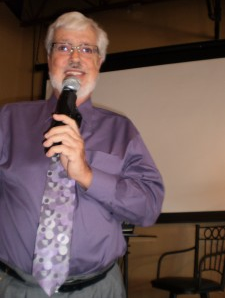Returning to Who He Was: Richard Taylor’s Journey as an Advocate
Here is a beautiful description of who Richard Taylor was and his profound work,
by Deborah Shouse.
Returning to Who He Was:

Richard Taylor’s Journey as an Advocate
“If you know one person who has dementia, you know one person who has dementia.” Richard Taylor PhD and …
“Dementia has brought me back to who I was to begin with,” says Richard Taylor, PhD. “I’m more self confident in myself. I feel an intensity in the moment that I didn’t have before.”
Living the Before and After: From Professor to Unemployed to Author and Speaker
Before he was diagnosed with dementia, Richard was a professor of psychology. At age 62, he was a popular lecturer, witty, well read, with an easy manner and a welcoming charm. But when he was diagnosed with dementia, Richard lost his professional standing, his job, his driver’s license, his confidence, and his optimism. He found himself crying ceaselessly, not really understanding why.
“I didn’t even know anything about dementia,” Richard says. “I had fears about losing control of myself. I thought the transition from one stage to another was abrupt, that a curtain would drop and suddenly I wouldn’t know the world and the world wouldn’t know me.”
To stem these fears, Richard began to write daily, capturing these thoughts and activities: he was, after all, a psychologist and used to analyzing things. Every morning, he read his previous day’s writings.
After he had accumulated a year’s worth of writing, he read some excerpts to the members of his Early Onset support group.
His group identified with his fears and feelings and urged him to take his pages down to the caregiver’s support room and slide them under the door. Richard did.
After both meetings ended, some of the care partners sought out Richard to thank him for sharing his feelings and insights. Months later, someone from Health Professionals Press called and asked if they could publish Richard’s writings. His book was titled Alzheimer’s from the Inside Out.
Turning into an Advocate and Speaker
“Since I’d written a book, people thought I seemed smart and interesting,” Richards says.
He was invited to read parts of the book.
“My introductions to my readings got longer and longer,” Richard says. “I wanted to share my dementia story, so I talked about my life and what it felt like. I’ve always felt people with dementia are the only true experts on the subject. You can imagine you’re blind, but you can’t imagine you have dementia. Dementia is so individualized as to how each person expresses it. Our brains each have different strategies.”
Soon people were paying Richard to share his insights at conferences and conventions and his speaking career began.
He starts his presentations by saying, “My name is Richard and I am living with the symptoms of dementia.”
But Richard didn’t confine his advocacy to speaking. He also worked with the Houston Art Museum and the Metropolitan Museum of Modern Art to bring an art program for people with dementia to the gallery. Richard traveled to MOMA, learned about the program, worked with the Houston docents, and was a catalyst for bringing the program to the Houston community.
Understanding the Loss and Lack of Meaning
Imagine losing your job, your car and your sense of passion and purpose. You feel you’ll never again do the activities you love, make new friends or try new hobbies. Your life is static and boring and you feel out of place and alienated, even in your own home.
Richard believes many with dementia prematurely talk themselves into a wheelchair and into not communicating. They give up. He understands the loneliness and despair that can overtake someone living with dementia.
“Strangers start hugging and kissing you and talk louder to you and never ask for your opinion and are more effusive in their positive emotions with you. After a while, you just go along. So when people say, ‘How are you doing honey?’ I say, ‘I’m doing fine.’”
Reigniting His Purpose
Richard hopes his personal stories will inspire care partners to look for opportunities to bring more joy, connection, and satisfaction into life. He understands how important it is to feel a sense of purpose. As a debater, a professor, and a raconteur, Richard has always defined himself through his speaking and writing.
“Through my speaking and advocacy, I have reignited my sense of meaning,” Richard says. “People clap when I talk and this reassures me.”
Part of Richard’s purpose is helping care partners see their loved ones as whole and complete. He writes, “Just because my memory sometimes fails me, just because my cognitive abilities seem to slip…please know that in my own heart and mind, I am still me. I am not becoming any less a person simply because I cannot remember like you, talk like you do, or think as you do. I am still Grandpa, and Dad, a friend.”
Richard believes, “Dementia is about living a purposeful and purpose filled life, not dying from its causes.”
Creative Sparks:
When talking with someone who has dementia, Richard has this advice:
· When greeting someone who has dementia, say, “Hello, it’s me, Deborah.” Then pause, allowing time for a response.
· If you don’t know how to act or what to say when you’re visiting a friend with dementia, try to learn more about what your friend is experiencing. You might ask, “What have you learned from living with dementia?” Or, “What changes are you having to cope with?” Or, “How can I make our time together more meaningful?
· See the person as a whole human being.
· Look for opportunities to add autonomy, purpose, and adventure to the person’s life.
 Thanks to Richard Taylor for sharing his wisdom.
Thanks to Richard Taylor for sharing his wisdom.
Article by Deborah Shouse, DementiaJourney.org





One Reply to “Returning to Who He Was: Richard Taylor’s Journey as an Advocate”